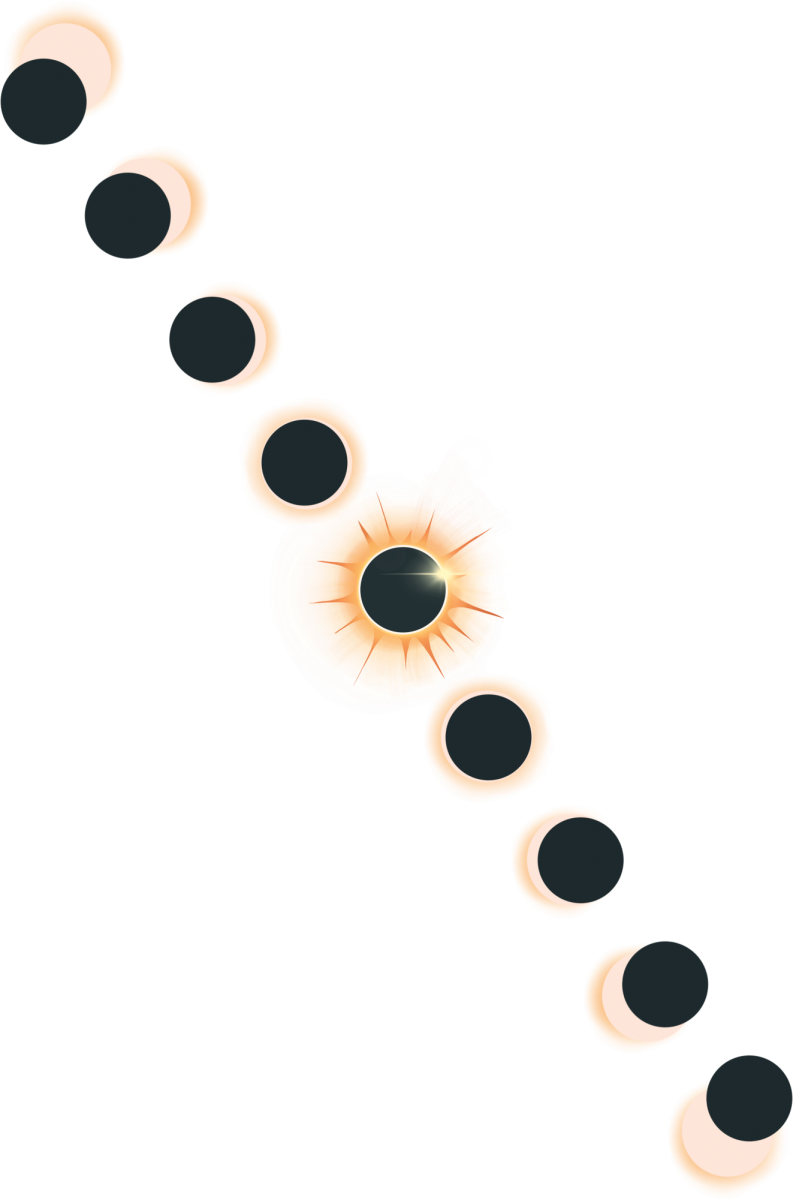For the first time in 150 years, Austin will be in the path of complete darkness for the solar eclipse on April 8, 2024. While many people in northern and western states will have to travel to view the eclipse, Austinites can enjoy darkness from the comfort of their homes.
Unlike the October partial eclipse, Austin will experience almost two minutes of complete darkness at around 1:30 p.m.. Due to Austin’s location in the path of totality, Austin Independent School District (AISD) officials will provide students with protective eyewear to view the eclipse, and in addition, LASA students will be temporarily released during their third periods to view the eclipse as it passes over Austin. According to LASA astronomy teacher Ellen Owens, solar eclipse glasses and pinhole cameras, devices that allow students to view the unique shadows caused by the eclipse, are essential on eclipse day.
“For a pinhole camera, you get a note card and you punch a hole in it so that you can see the effects of the eclipse on the ground even ahead of time when it’s partial,” Owens said. “Then, you can see the shadows, and you can also see [the shape] of the eclipse as the light goes through the leaves and trees. You’ll see a bunch of rings on the ground.”
Owens stressed the importance of students putting their phones down to enjoy the solar eclipse. She stated that the complete darkness from the eclipse only lasts a few minutes, and to enjoy the moment.
“They should put their cell phones down,” Owens said. “Don’t try to take a picture of it. It’s so short, it’s gonna be like a minute, just enjoy it. It’s one of the few times that you can truly see the motion of the earth and moon or really of the motion of any celestial body in a given moment. There are solar eclipses somewhere on the earth probably one to three times a year, but it’s a very narrow path in which you can see it, and as you know, most of the surface of the earth is ocean. So most of them happen and nobody is there to see them.”
According to Owens, sunlight isn’t the only aspect of nature that will be affected during the eclipse. Students can expect animals to have surprised reactions, not only to the lack of light, but also the drop in temperature of a few degrees.
“The temperature will drop, and the animals will react, so we will likely hear a lot of birds going crazy,” Owens said, “and really that’s because it’s such a dramatic drop in radiation and in temperature. Of course, it only lasts a minute or so, and then the sun comes right back.”
Amy Jackson, the founder and current director of Starry Sky Austin, an organization that exposes students to astronomy, shares how this upcoming event is extraordinary and how scientists and researchers across the U.S. use this solar eclipse to delve deeper into their projects, learning more about the universe and astronomical discoveries. Jackson was recently involved in the creation of new devices at The University of Texas at Austin under their LightSound Program that will record and convert the light intensity of the solar eclipse into sound to allow people who are visually impaired or blind to be a part of the experience.
“We are creating these devices that sonify the change in light intensity during an eclipse, and I got to go and solder the circuit boards and make the device work,” Jackson said. “Then people sign up and they’re able to have a device, and we can be a data collector. It’s an opportunity for people like me who do outreach to go and provide an experience for people who normally would not have one because they can’t see. It’s just so cool.”
James Ervin, a senior at LASA, leads the Astronomical Club and the K5LBJ Radio Club. Ervin plans to use this opportunity to further his research on whether time scales broadcasted over radio waves will be affected by the solar eclipse.
“As the eclipse is occurring over this path,” Ervin said. “We want to be listening to all three of those frequencies to see, okay, how does that delay change? It’s really cool, and so I’m also reaching out to the local radio community here in Austin to get them involved in the research. We already got a guy who is willing to dedicate a few receivers to this, which will help us make [our experiments] happen.”
Educational opportunities aside, Owens is excited for the opportunity to experience a once-in-a-lifetime astronomical event. Eclipses have historically sparked interest in astronomy, according to Owens.
“It is such a rare opportunity unless you’ve traveled to see one,” Owens said. “This is my first total eclipse. The next one is not going to come through the U.S. for probably near the end of your lifetime.”






